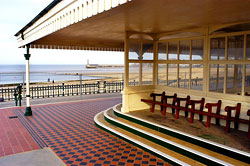Book Notes From The UK
The fight to save a literary tourist town, a 91-year-old library patron, protesters for Boarders, and other bookish news from the England.
No matter how many times the British want to deny they are a rather eccentric bunch, the evidence suggests otherwise. When I started this news round-up, I expected it to be a rather dry affair of book fairs, disappointing figures from the latest London auctions, and perhaps some distinguished elderly gentleman giving a roaring speech about saving his local library, and that kind of thing. Instead what we have includes the battle for the survival of a little seaside spot where Eliot wrote The Waste Land, a couple thrown out for fighting at an upmarket book festival, and a storming demonstration of hundreds supporting Borders. Yes, I did say supporting. All those stories are worthy of a whole essay, but as time and space is limited, here is a quick overview of what your British cousins have been up to recently in the not so tranquil world of books.
Margate is a little seaside resort off the coast of Southern England with a population just over 40,000, it enjoys a glorious artistic movement and has inspired writers, poets, and artists throughout the years including JMW Turner and TS Eliot. Feel like visiting? Well, since the 1960s it has witnessed a spectacular decline from an inspirational town attracting millions of visitors to a washed out, shabby seaside resort with deserted streets. The artist Tracy Emin, a former Margate resident, commented recently “There is nothing to come back to in Margate, it’s depressing.” With closed down shops, deteriorating architecture, a high unemployment rate, low wages, problems with teenage pregnancy (as “celebrated” in art by Tracy Emin), and a spiralling crime rate, it is fair to say Margate is not many peoples’ first choice for a holiday destination. The odd attempt at bringing art and culture to the town has seen rather mixed results, as witnessed by the on-off-on again building of a new art gallery, due to open next year. Now Margate is clinging onto its claim of poetic greatness with an application to have a seaside shelter where Eliot did some of his writing listed as a protected building.
Led by the former poet laureate, Andrew Motion, the British literature scene is standing up and fighting for the survival of this shelter, with Mr. Motion declaring “anyone that cares about poetry, the shelter is a shrine, a temple, a small monument to a great genius.” Eliot’s second wife, Valerie Eliot, and the author Alan Bennett lending their support, a request has been put to the British secretary of state, Ben Bradshaw, by Margate council to secure the future of the shelter. They might have found a way to guarantee that no matter what lies ahead for Margate, this humble seaside shelter, built in 1910, will be safe. It might not get the tourist crowds in, or do much for the town’s unemployment rate, though. Perhaps the local residents will all huddle around this small shelter penning lines of bewilderment and sacrifice?
You may be familiar with the anti globalization demonstrations that take place from time to time whenever a new multi-national chain opens, but in the small British town of Swindon, hundreds turned up at a demonstration to protest against the proposed closure of a Borders store in a local mall. One protester said, which must sound like honey to the chain’s ears, “Borders is not just a book store, it was a hub for people to meet one another and to be around books.” Despite the overwhelmingly positive feeling for the company, not a single representative of Borders has met the protesters or made any statement to the media. Interestingly, the book-loving population of Swindon also had their independent book shop, the Victoria book shop, closed down recently, which did not receive a single demonstration.
There are sketchy details of the goings on of an upmarket literature festival in Cornwall this July. Apparently police were called after two women got into an argument with a member of staff who was then punched in the face. I imagined this was after an argument about who saw the first edition of Virginia Woolf first, but rather disappointedly it turns out the staff member merely requested the “lady” put out her cigarette which caused such uproar!
Talking of Virginia Woolf and Cornwall, the little 10-mile stretch of coastline that was supposedly the inspiration behind To the Lighthouse has been bought by a private London investor for $130,000. The new mystery buyer has no rights to develop the beach, which is a popular spot among surfers and walkers, but Richard Argles, director of auctioneers Colliers who sold the beach, said ““She does not plan to do anything with the beach other than simply own it.”
Newly released government secret documents show that the celebrated British author JRR Tolkien trained as a spy in the run up to the Second World War in 1939, just 18 months following the publication of his first novel, The Hobbit. He completed a three-day course in London, but rejected their offer of full-time employment as a spy at the British code breaking HQ Bletchley Park. There is no explanation why he didn’t go ahead with the offer of £500 a year, but I suspect he had a certain renowned trilogy to get working on, greatly inspired from his experiences in the trenches in the First World War.
Finally, I couldn’t finish this report without mentioning a lady in Scotland who enjoys reading books. You may think with the continuing rise of entertainment, that this is a worthy news piece in itself. Let me add that Louise Brown, 91, is about to borrow her 25,000th book from her local library. She has been a member since 1946.That’s about eight books a week. This deserves a medal because let’s be realistic, are there even 25,000 decent books out there in the English language?








